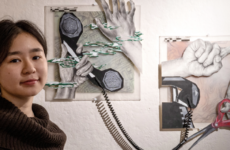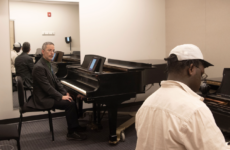
Photo by Toffy Prakittiphoom/The Choate News
A white room, a seemingly delusional character with uneasy laughs, a set of flashing lights, and a group of ushers reciting an enchanting speech opened the Choate production of Everybody, written by Branden Jacobs Jenkins, last Thursday, February 17, through Saturday, February 19 on the Paul Mellon Arts Center (PMAC) Main Stage. The play’s director and acting teacher, Mr. Bari Robinson, strove to demonstrate the script’s “extreme lucidity, fantasy, and dream-like quality” as it describes a person’s state of mind on their deathbed. The set, lighting, and costumes that featured bedazzled skeleton suits all worked to create an ominous, yet fantastical environment.
The play portrays moments that define mortality, the middle ground between being alive and dead. Everybody is an adaptation of the 15th-century morality play Everyman, which elucidated how someone should live if they desire to go to heaven. Everybody, on the other hand, emphasizes, as Mr. Robinson put it, that “you die, and we know that’s true,” and questions how we grapple with that reality.
After watching a production of Everybody a few years ago and being immensely touched by it, Mr. Robinson recognized the value this play would bring to the Choate community. Besides the content of the play, introducing the school to more playwrights of color, like Branden Jacobs Jenkins, is of great importance to Mr. Robinson.
The characters in this play —such as Everybody, Friendship, Death, and Stuff — are immensely unrestricting. “It’s a very malleable script because literally, anyone can play any role in the entire thing,” Mr. Robinson said. “It is not bound by gender or race or anything. So in that way, it’s as inclusive of a play as you can make.” For this reason, he also strove to cast a diverse group of actors who represented different races, genders, and body types. “In terms of who gets to play, it is important that it’s not one kind of person, [and] that it’s a lot of different kinds of people. The play is supposed to be upending your preconceived notions of identity,” Mr. Robinson explained.
In the original play, actors are assgined characters at random right before the performance. For the production at Choate, only the character Everybody was played by a different actor every night. “That’s a tricky thing, even for professionals,” Mr. Robinson noted, as rehearsals consisted of a lot of repetition where scenes were run several times with different actors. It was crucial that each part was played the same way by different actors, “otherwise, the actor playing the opposite role is not gonna know what to do,” he said.
Furthermore, “acting out the process of death and the hefty script presented a really difficult challenge,” reflected Campbell Pflaum ’23, who played the character Evil.
Mr. Robinson encouraged the actors’ use of critical thinking in interpreting different characters and conveying them to the audience. “What do you want, and how are you going to get it?” was a question that he often posed to them.
“A lot of the work we did in rehearsal was working with philosophy, like asking why the character Everybody does what they do in the show, and what that says about what humanity does, and why we act the way we act,” said Pflaum.
Noah McBride ’23, who played Kinship, expressed that he focused on understanding how the familial relationship that his character symbolizes can also bring disappointment when “someone that you expect will always be there for you, someone you are genetically bound to, is no longer there for you in your dire time.”
In order to bring the play’s vision to life, the cast relied on the trust that they shared as a close-knit group. Without trust, “you won’t be able to take risks on stage, you won’t be able to get your full potential, because you’ll have that armor up, and you’ll be defensive,” Mr. Robinson said.
The relevance of Everybody in our community extends to the Covid-19 pandemic, which has forced us to come to terms with our mortality. “I think the play is an explanation of the way the human psyche processes mortality — it’s about what we have left at the end of life and what we lose,” Pflaum said.
Mr. Robinson encourages the Choate community to consider the message of Everybody — “in spite of our differences and our circumstances in life, we have the ability to show empathy and grace to one another and know that we’re all going to end up in the same place. So why not try to be as good to each other as we can?”




